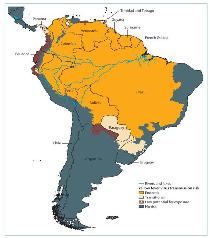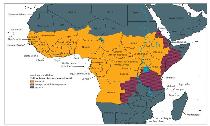It's a New Day in Public Health.
The Florida Department of Health works to protect, promote, and improve the health of all people in Florida through integrated state, county, and community efforts.
Yellow Fever Virus (YFV)
Yellow fever is caused by infection with yellow fever virus (YFV), a flavivirus in the same family as west nile virus and dengue virus. Yellow fever was previously a major public health concern in the United States and was responsible for several large outbreaks in Florida during the 1700's and 1800's. Yellow fever currently occurs only in tropical regions of Africa and parts of South America. The last epidemic in North America occurred in New Orleans in 1905.
- Symptoms and Treatment
- Transmission
- Information for Travelers
- Resources
Symptoms
After becoming infected, the incubation period of yellow fever is usually three to six days. Illness ranges in severity from a self-limited febrile illness to severe hepatitis and hemorrhagic fever. Symptoms of severe infection are high fever, chills, headache, muscle aches, vomiting, and backache. After a brief recovery period, the infection can lead to shock, bleeding, and kidney and liver failure. Liver failure causes jaundice, the yellowing of the skin and the whites of the eyes. Severe infections can be fatal.
Treatment
There is no specific treatment, only supportive care and treatment of symptoms. Aspirin and other non-steroidal anti-inflammatory drugs (such as ibuprofen and naproxen) should be avoided because these may increase the risk for bleeding.
YFV is transmitted to humans through a bite of infected Ae. aegypti mosquito. This mosquito is found in Florida and also serves as the vector for dengue and chikungunya. While YFV is not is not circulating in North America, the risk of introduction is possible due to viremic traveler importation of the virus, the presence, the vector, and a susceptible population.
 Yellow fever is a rare cause of illness in U.S. travelers to endemic countries. Fortunately, it can be prevented by vaccination. Vaccination is the most important preventive measure against yellow fever. The single dose vaccine is safe, affordable and highly effective. The vaccine confers sustained immunity and life-long protection against yellow fever disease without the need for a booster. The vaccine provides effective immunity within 30 days for 99% of persons vaccinated.
Yellow fever is a rare cause of illness in U.S. travelers to endemic countries. Fortunately, it can be prevented by vaccination. Vaccination is the most important preventive measure against yellow fever. The single dose vaccine is safe, affordable and highly effective. The vaccine confers sustained immunity and life-long protection against yellow fever disease without the need for a booster. The vaccine provides effective immunity within 30 days for 99% of persons vaccinated.
Travelers should be vaccinated  for yellow fever before visiting areas where it occurs. International regulations require proof of vaccination for travel to and from certain countries. Travelers should also take the precautions against mosquito bites found in this CDC travel guide.
for yellow fever before visiting areas where it occurs. International regulations require proof of vaccination for travel to and from certain countries. Travelers should also take the precautions against mosquito bites found in this CDC travel guide.
Additional travel information can be found in CDC's Health Information for International Travel book for Travelers' Health or Yellow Fever Vaccine | Yellow Fever Virus | CDC
If you are a licensed physician or pharmacist with a valid Immunization Administration Certificate interested in becoming a State of Florida Yellow Fever Vaccine Provider, please visit How to Become a Florida Yellow Fever Vaccine Provider web page to begin the certification process.
*Note: This page contains materials in the Portable Document Format (PDF). The free Acrobat Reader may be required to view these files.



Connect with DOH